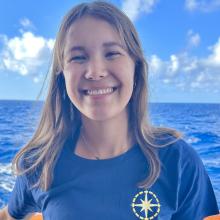
Annemarie Wood
Tell us about your work/research. What kinds of things do you do?
I’m primarily researching how environmental DNA (eDNA) can be used to characterize the biodiversity of deep-sea ecosystems, with a focus on corals, gelatinous zooplankton, and sponges. eDNA can be any genetic material left in the environment, such as skin cells or mucus, and eDNA analyses are especially promising because we can learn about organisms that have been historically difficult to study. They might be elusive, or tiny and easily overlooked, or simply happen to be absent when we’re looking for them. I mainly work in the lab to determine the genetic sequence of eDNA from ocean water samples, and then analyze that sequencing data to figure out what types of species there are and how many. Humans still know very little about the deep sea, so ultimately we want to show the incredible variety of life that exists in these remote parts of the world.
What sparked your initial interest in your career?
When I was growing up, I spent most summers visiting my family along the coast of Maine. My fascination with the ocean started growing during those days where I’d run around on the beach at low tide, inspecting all these strange creatures and wondering what they’re up to. I thought it was so cool that the ocean was essentially an alien world, only on the same planet instead of lightyears away. Those early experiences prompted me to take an oceanography class my first year of college and although I’m not a physics person, it was really interesting for me to learn about all these currents and large-scale processes that I had no idea existed. I think that was when it really sank in that there is much more going on in the ocean than we tend to think about on a day to day basis, so I got curious and started taking more marine science classes.
Who influenced you or encouraged you the most?
I’ve been lucky enough to have incredible mentors in this field. The professor of that oceanography class ended up being my undergraduate thesis advisor; she really influenced how I think about conducting scientific research as well as the intersectionality of that research with other fields like politics, anthropology, etc. My current PI and the people in my current research lab are also amazingly supportive and have created such a great space for me to learn without being afraid of failure.
What element of your work/study do you think is the most fascinating?
I think it’s fascinating how we are constantly encountering organisms that no one has seen before and the crazy adaptations and morphologies that these deep ocean creatures have in response to their extreme living conditions.
How did you get involved with the Ocean Exploration Trust?
I got to know one of the lead scientists during a project we're working on together and he asked if I’d be interested in going on a research cruise this summer. I said umm of course I’m interested! And here I am.
What other jobs led you to your current career?
I used to want to be a wildlife veterinarian, so during undergrad I had one internship working at a sanctuary for farm animals and another at a wildlife rehabilitation clinic. Although I ultimately decided that I didn’t want to go to vet school, I loved both of those experiences and appreciated how hands-on the work was. I also did an internship at a marine mammal research institute that was my first experience conducting field work and data analysis for an independent project. All of my past work experiences have helped me realize what I like and don’t like in a job, career, or workplace environment. Working with children as a babysitter and camp counselor was also really fun for me, and I try to incorporate education and outreach aimed at kids in my current job whenever possible.
What are your degrees and certifications?
Bachelor of Science in Biology with a Minor in Environmental Studies – Haverford College 2023
What are your hobbies?
Lately I’ve been into dissecting movies with my friends and looking for weird items at flea markets. I also like rock climbing, drawing, running, and photography!
What advice would you give someone who wants to have a career like yours?
My advice would be to look for people who are doing things you’re interested in and just go talk to them! They’ll usually be open to answering at least a few questions and that way you get to learn firsthand about what it is they do, how they got there, and what kind of skills are most useful to have for working in that field.
Expeditions
Annemarie participated in the following Ocean Exploration Trust expeditions:
